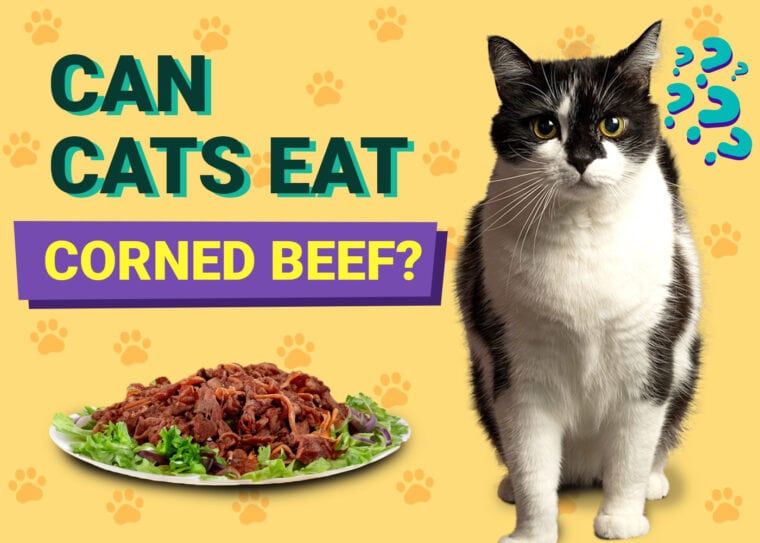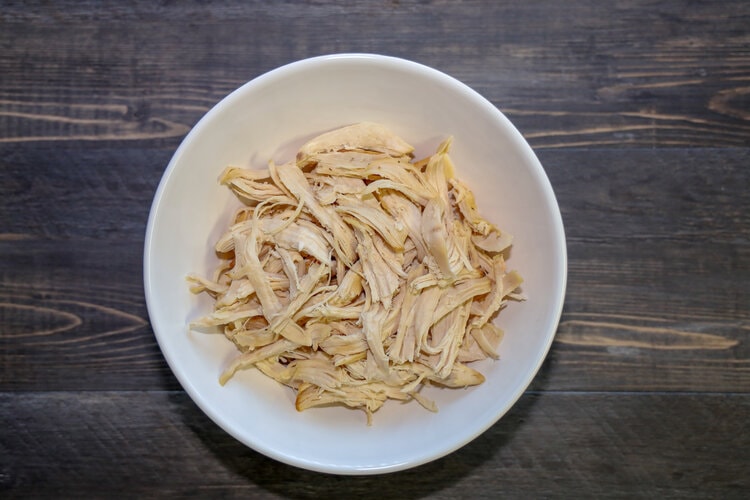
Corned beef is a cured beef dish that has its origins in the United Kingdom and is a favorite dish for many people around St. Patrick’s Day, especially in the United States. Since this dish is indeed made of beef, your cat may be tempted to eat some (or may accidentally steal some. This may leave you wondering if your cat can eat corned beef?
If your cat steals some corned beef off of your plate, it likely isn’t going to hurt them. However, they shouldn’t eat large amounts of corned beef due to the high amounts of salt and other spices used to make it. If your cat has eaten some corned beef or you’re just wondering if you can feed them some, it’s important to understand the potential benefits and risks associated with the food. Here’s what to expect.
Is Corned Beef Safe for Cats?
Corned beef is a beef dish that’s made by curing meat with salt and other spices. Corned beef is generally safe for cats in small amounts but can cause illness in cats if they eat too much. Because of its high salt content, it may cause health problems especially in cats that already suffer from health conditions. Note that a cat would have to eat quite a bit of salt in order for salt toxicity to occur (more than what they would get from eating a small amount of corned beef),1 however, your cat doesn’t necessarily need more salt than what they would get in their normal diet.
Canned corned beef is worse as it contains more ingredients and seasonings that your cat may be allergic to or that may be harmful to your cat, as well as more sodium overall. So, while you can give your cat corned beef from the deli, it’s best to do this sparingly, and canned corned beef should be avoided entirely.

Potential Issues With Cats Eating Corned Beef
Plain corned beef is typically safe for cats in small amounts. However, avoid giving your cat any corned beef that has been seasoned with spices and seasonings. Many seasonings are toxic for cats, especially things such as garlic and onion. In addition, corned beef usually requires a spice mix, which contains things like bay leaves, cloves, and chilly flakes, which are toxic or irritating to cats.
Corned beef, especially if it is seasoned, should definitely not be fed to your cat as part of their regular diet. However, if your cat were to sneak a bite off your plate, it probably wouldn’t hurt them. But it’s a good idea to look for signs such as vomiting and diarrhea or any other unusual behaviors from your cat.
If you notice any of these signs after your cat ate some corned beef or are just concerned in general, it won’t hurt to reach out to your vet for further guidance and advice.
What Other Foods Should Not Be Given to Cats?
While cats are naturally picky, there are some foods you should avoid giving them. Let’s take a look at the most common ones that veterinarians recommend avoiding.
Sugar & Sweets
Unlike humans, cats aren’t sugar addicts. This means that you should never feed them sugar or sweet treats, whether they’re homemade or from the store. While cats might love these sweet foods, they also have no nutritional value and anything more than a few sweet treats can make them sick.
A cat’s diet shouldn’t consist of more than 3% sugar a day. Instead, feeding your cat these treats will only give them empty calories and cause them to gain weight quickly. So, while it’s not toxic to them, it’s definitely not good for them either. Additionally, sugary foods may negatively impact your cat’s dental health.
Dairy Products
Most cats are lactose intolerant, which means they can’t digest milk, cheese, and other dairy products. Instead, you should feed your cat a complete and balanced cat food and water, which are both much healthier options. With this kind of food, your cat will get the protein containing all the essential amino acids that they need, including fat, minimal carbohydrates, plus the minerals and vitamins they need to stay healthy.
Avoid giving them dairy products, as these will only put them at risk for getting sick. Lactose, the sugar in dairy, isn’t digestible for adult cats. That means that their small intestine does not break down the sugar and it will enter their large intestine and bloodstream, potentially causing issues.

Caffeine and Alcohol
Cats should never be given alcohol or caffeine. Cats can be adversely affected by the consumption of caffeine and alcohol. Because cats have a high sensitivity to both substances, even small amounts can be harmful to them – especially alcohol. Besides coffee, caffeine is sometimes found in foods and medications, and cats can be exposed to it by consuming these products.
Ingesting caffeine or alcohol can cause vomiting, diarrhea, increased heart rate, seizures, and, in extreme cases, death. If a cat has ingested caffeine and is showing any of these signs, they should be taken to the veterinarian immediately.
Fried Food
It may be very tempting to toss your cat a fried chicken tender from the dinner table, but don’t do it. Many fatty foods are healthy for cats, like salmon, mackerel, beef, and lamb. These kinds of meat are rich in omega-3 and -6 fatty acids, which are great for your cat’s skin and coat.
However, deep-fried chicken tenders are extremely high in calories and can be a bit rough for your cat’s tummy, causing gastrointestinal upset, diarrhea, and vomiting.
Raw Meat and Eggs
Cats love to have raw meat, and if meat is going to be offered raw, certain hygienic standards need to be practiced to keep it safe. Raw beef and chicken could potentially pose a number of health risks to your cat, such as getting sick from ingesting Salmonella or Listeria. Raw meats can be safe if they have been high-pressure processed (HPP), and eggs need to be in-shell pasteurized; otherwise, we recommend you avoid feeding your cat raw meat or raw eggs, as these are very dangerous for them.
Chocolate
Chocolate is a very treat that is very rich in calories that is loved by and often consumed by humans. However, chocolate is toxic to cats! Theobromine and caffeine are two toxic substances in chocolate, and it to your cat is very dangerous and could even cause death.

Human Medications
Although not a food, we’ve included this in the list because of its common occurrence. If you notice that your cat is exhibiting signs of diarrhea, joint pain, or vomiting, do not give them any of your medications or over-the-counter drugs that are intended for humans.
Many human medications are toxic to cats, and they can cause serious health issues. This includes prescription drugs, over-the-counter medications, and herbal supplements, as many of these contain ingredients that are harmful to felines. Instead, visit your veterinarian, as they are trained to properly diagnose and treat your cat.
Cat-Safe Corned Beef Alternatives
Baked or Grilled Beef
Instead of offering your cat spice-containing or, even worse, ultra-processed canned corned beef, offer them a low-fat beef cut or a tiny piece of baked steak. Believe us when we say they will not mind if it was not “corned beef”.
Now that we’ve discussed what not to feed your cat, let’s take a look at what you can give your cat. Here are some common everyday human foods that are okay to feed your furry friend, but note that cats are carnivores and don’t necessarily need these things to be healthy, especially on a regular basis.

Shredded Chicken
Another great option to share with your cat instead of corned beef is plain boiled and unsalted chicken, your kittie will love it and this can be minced in such tiny pieces that you can even use them to train your cat.

Knowing exactly what your feline companion can and cannot eat will help you become the best pet parent. Recognizing that not all cat bowls are equal is also key! The Hepper NomNom Cat Bowl sets itself apart from traditional options by catering to the specific needs of cats. The innovative design offers whisker relief via shallow dishes and promotes digestion with a slight bowl elevation. Find out if the Hepper NomNom is right for your cat by clicking here.
At Pet Keen, we’ve admired Hepper for many years and decided to take a controlling ownership interest so that we could benefit from the outstanding designs of this cool cat company!
Wrapping Things Up
So, can your cat have corned beef? Yes. Is it the best meal for it? Not necessarily. Corned beef contains a high amount of salt and may have spices or other other ingredients that may not be good for your cat. If you do choose to give your cat corned beef, it’s best to get it fresh and plain from the deli and to only offer it in moderation, although we feel it is an unnecessary risk. If you want to treat your kitty, go simple and offer them a piece of plain, baked or grilled lean beef without any extra spices, or a couple of pieces of shredded chicken.
Featured Image Credit: CKP1001, Shutterstock










